
Photo from wikipedia
Introduction: The importance of a multidisciplinary team for intestinal rehabilitation in children with intestinal failure (IF) is accepted internationally and is a standard of care for patients managed by the… Click to show full abstract
Introduction: The importance of a multidisciplinary team for intestinal rehabilitation in children with intestinal failure (IF) is accepted internationally and is a standard of care for patients managed by the New Zealand National Intestinal Failure Service (NZ NIFS). The aim of this study was to understand the ongoing burden of care for children with IF in NZ who achieved enteral autonomy as their primary outcome. Methods: The NZ NIFS patient registry collected data for patients with IF as defined by the requirement for intravenous nutrition (IVN) for ≥ 21 days for paediatric patients up to 18 years of age and ≥ 30 days for preterm neonates (< 34 weeks gestation). Data were collected from October 2015 to October 2018. Primary clinicians of patients with IF reported data in conjunction with NZ NIFS and information was obtained from patient records. Data collected included ethnicity, social deprivation index, cause of IF and clinical outcome. For patients that achieved enteral autonomy as their primary outcome and had at least 12 months follow up, further information was collected regarding feeding outcomes and multidisciplinary professionals involved in their care at 12 months after ceasing IVN. The number and indications for readmissions for this patient group over this 12 month period were also collected. Results: Of 208 children with IF over a 3 year period, 128 (62%) patients achieved enteral autonomy and had 12 months follow up after ceasing IVN. Of this group, most common causes of IF were mechanical obstruction and short bowel syndrome. At 12 months follow up, 117 (92%) children were having an age appropriate oral diet, including 27 (21%) also needing supplementary drinks, and/or enteral feeding in combination with their oral diet. One hundred and seven (84%) children required review by a paediatrician and 56 (44%) still required a surgeon. Community nurse input had continued for 61 (48%) of children and allied health services including dietitians 56 (44%) and speech and language therapists 42 (33%) were also required. Twenty nine (23%) of the children were readmitted to hospital for reasons related to IF during this period. Conclusion: The burden of care for children with IF does not end with enteral autonomy and this group of patients often require ongoing interventions and multidisciplinary input. P3.37
Journal Title: Transplantation
Year Published: 2019
Link to full text (if available)
Share on Social Media: Sign Up to like & get
recommendations!